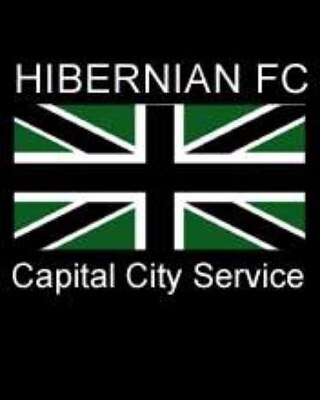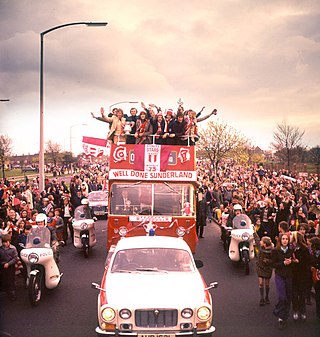
Seaburn is a seaside resort and northeastern suburb of Sunderland, North East England. The village of Whitburn borders the area to the north. To the west and south-west is Fulwell and to the south the coastal resort of Roker.

Football hooliganism, also known as soccer hooliganism, football rioting or soccer rioting constitutes violence and other destructive behaviors perpetrated by spectators at association football events. Football hooliganism typically involves conflict between pseudo-tribes, formed to intimidate and attack supporters of other teams. Certain clubs have long-standing rivalries with other clubs and hooliganism associated with matches between them can be more severe. Conflict may arise at any point, before, during or after matches and occasionally outside of game situations. Participants often select locations away from stadiums to avoid arrest by the police, but conflict can also erupt spontaneously inside the stadium or in the surrounding streets. In extreme cases, hooligans, police, and bystanders have been killed, and riot police have intervened. Hooligan-led violence has been called "aggro" and "bovver".
The casual subculture is a subsection of football culture that is typified by hooliganism and the wearing of expensive designer clothing. The subculture originated in the United Kingdom in the early 1980s when many hooligans started wearing designer clothing labels and expensive sportswear such as Stone Island, CP Company, Lacoste, Sergio Tacchini, Fila, Hackett, ellesse, Napapijri, & Fred Perry in order to avoid the attention of police and to intimidate rivals. They did not wear club colours, so it was easier to infiltrate rival groups and to enter pubs. Some casuals have worn clothing items similar to those worn by mods. Casuals have been portrayed in films and television programmes such as ID, The Firm, The Football Factory, and Green Street. The documentary Casuals: The Story of the Legendary Terrace Fashion featuring Pat Nevin, Peter Hooton and Gary Bushell amongst others is about the fashion that started in the late 70s and into the 1980s.

The Tyne–Wear derby, also known as the Wear–Tyne derby or the North East derby, is a local derby between the association football clubs Sunderland and Newcastle United. The derby is an inter-city rivalry in North East England with the two cities of Sunderland and Newcastle upon Tyne just 12 miles (19 km) apart. Sunderland play their home matches at the Stadium of Light whilst Newcastle play their home matches at St. James’ Park. The first meeting of the two sides took place in 1883, with the first competitive fixture being an FA Cup tie in 1888 which Sunderland won 2–0 over Newcastle East End.
The Zulu Warriors are a football hooligan firm associated with English football club, Birmingham City. The Zulu Warriors were formed in the late 1980s and the name allegedly came from a chant of "Zulu, Zulu" which Manchester City fans aimed at Birmingham in 1982, due to their multicultural following. However, both the "Zulu" chant and the term "Zulu Warriors", in the context of a fan following rather than as an organised gang, were in use from at least the mid 1970s.

The Leeds United Service Crew are a football hooligan firm linked to the English EFL Championship team, Leeds United F.C. The Service Crew were formed in 1974 and are named after the ordinary public service trains that the hooligans would travel on to away matches, rather than the heavily policed, organised football special trains. The Service Crew are one of the most notorious hooligan firms in the history of English football.

The Muckers are a football hooligan firm linked to the football club Blackpool F.C. They take their name from the word mucker, a colloquialism meaning good friend.
Section 5 are a football hooligan firm associated with Championship football club West Bromwich Albion F.C. Whilst Albion have had several other firms since the 1960s, including Clubhouse and the Smethwick Mob, Section 5 is the largest, with activity peaking in the 1980s and 1990s.
The Millwall Bushwackers are a football firm associated with Millwall Football Club. Millwall have a historic association with football hooliganism, which came to prevalence in the 1970s and 1980s, with a firm known originally as F-Troop, eventually becoming more widely known as the Millwall Bushwackers, who were one of the most notorious hooligan gangs in England. On five occasions The Den was closed by the Football Association and the club has received numerous fines for crowd disorder. Millwall's hooligans are regarded by their rivals as amongst the stiffest competition, with Manchester United hooligan Colin Blaney describing them as being amongst the top four firms in his autobiography 'Undesirables', and West Ham hooligan Cass Pennant featuring them on his Top Boys TV YouTube channel, on which their fearsome reputation for violence was described.
The MIGs are a football hooligan "firm" associated with the English football club Luton Town, which was originally formed in the 1980s.
The Real Football Factories is a documentary series shown on the Bravo television channel in the United Kingdom and created by Zig Zag Productions. The show looks at the in-depth life of football hooligans and hooligan firms. Interviews are conducted with past and present hooligans.
Newcastle Gremlins are a football hooligan firm associated with the English football club, Newcastle United F.C.
Aston Villa Hardcore is a football hooligan firm associated with the Premier League club Aston Villa, based in Birmingham, England.

The Capital City Service (CCS) is a Scottish football hooligan firm associated with Hibernian F.C. and active from 1984 when the casual hooligan subculture took off in Scotland. Their roots were in the previous incarnations of hooligan groups attached to the club and also the wider Edinburgh and surrounding area's gang culture. They are more commonly known in the media and amongst the public as the Hibs Casuals, although within the hooligan network they may also be referred to as Hibs Boys.
The County Road Cutters are a hooligan firm associated with Premier League football club Everton F.C.

Beginning in at least the 1960s, the United Kingdom gained a reputation worldwide for football hooliganism; the phenomenon was often dubbed the British or English Disease. However, since the 1980s and well into the 1990s the UK government has led a widescale crackdown on football related violence. While football hooliganism has been a growing concern in some continental European countries in recent years, British football fans now tend to have a better reputation abroad. Although reports of British football hooliganism still surface, the instances now tend to occur at pre-arranged locations rather than at the matches themselves.

The Capital City Service (CCS) is a Scottish football hooligan firm associated with Hibernian and active from 1984 when the casual hooligan subculture took off in Scotland. Their roots were in the previous incarnations of hooligans attached to the club and also the wider Edinburgh and surrounding areas gang culture. They are more commonly known in the media and amongst the public as the Hibs Casuals though within the hooligan network they may also be referred to as Hibs boys.

Sunderland A.F.C. supporters are the followers of Sunderland A.F.C. an English professional football club based in the city of Sunderland, Tyne and Wear. Sunderland A.F.C. were formed in 1879 and joined The Football League for the 1890–91 season. They experienced an immediate period of success with five league titles in a decade between 1892 and 1902, and added subsequent titles in 1913 and 1936. Supporters of the club, and people from Sunderland in general, are traditionally called Mackems, but during their near century long tenure at Roker Park they were also referred to as Rokerites and Rokermen.
The 2018–19 Premier League Cup was the sixth edition of the competition. The defending champions were Aston Villa, who won the 2017–18 competition.








